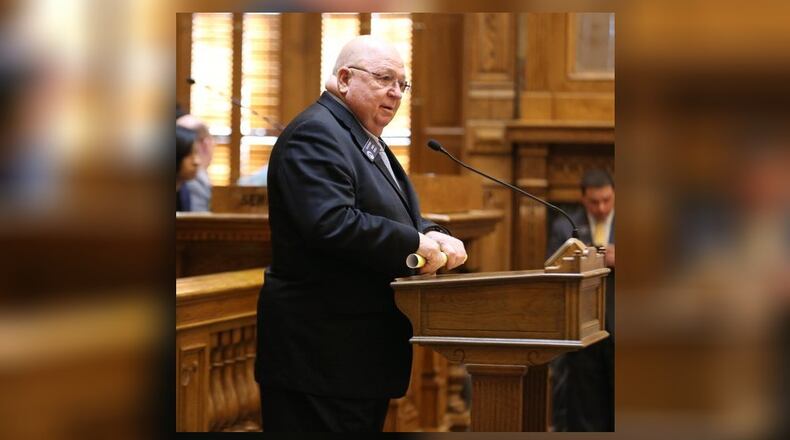State lawmakers haven’t seen much in the way of a pay raise in at least a decade, but they could see a boost in their pension under two bills that moved forward Monday.
The biggest increase could go to House Speaker David Ralston — or any future speaker.
The Senate Retirement Committee on Monday moved ahead with financial studies of Senate Bill 14 by Sen. Valencia Seay, D-Riverdale and Senate Bill 259 by Sen. Ellis Black, R-Valdosta — the chairman of the committee. Both would raise the relatively puny pensions that lawmakers receive once they've left the chambers and reach retirement age.
Either bill, if approved, could triple the pension of the House speaker.
The vote Monday means the committee will pay for actuarial reports detailing the cost of the bills. Once it gets the reports, the committee will decide whether to approve the measures. A similar pension proposal passed the House in 2018 but stalled in the Senate.
Lawmakers have long been leery about raising their pay or pensions. Some note that they know what the part-time job pays — most earn $17,324 a year — when they run for a seat in the House or Senate. Raising the pay or pension of lawmakers also isn’t something legislators want on their political resume come election time.
But many also say the job is no longer a part-time gig, and that higher pay and benefits could make it easier to attract good candidates to run for the General Assembly.
Besides the salary, lawmakers also receive $173 for each day they are in session or doing committee work.
Periodically, lawmakers or other state officials bring up the pay and talk about changing it.
A compensation committee in 2017 recommended rank-and-file lawmakers receive raises to $29,908, and that the speaker's salary go from about $99,000 a year to $135,000. Ralston, like many legislators, has a nonsession job. He is a lawyer, and The Atlanta Journal-Constitution and Channel 2 Action News earlier this year reported numerous occasions where he had made claims of legislative business to put off cases.
Seay filed legislation during the 2019 session to raise legislator pay, but it went nowhere.
Lawmakers vest into the pension system after eight years of service, and they receive $36 a month for every year they are in the House and/or Senate. So, for instance, a lawmaker who has served 20 years would be eligible for a $720-a-month pension when he or she reaches retirement age.
Unlike other part-time state employees, lawmakers and retired legislators also receive state-subsidized health insurance through the State Health Benefit Plan, which covers more than 650,000 Georgia teachers, employees, retirees and their dependents.
Under the bills, lawmakers would be eligible to receive 38% of their highest salary or $50 per month per year of service as a pension, whichever is higher. It would also increase the contribution lawmakers make into the system to help pay for the higher pension.
At $50 per month, per year, a lawmaker serving 20 years would receive $1,000 a month as his or her pension.
Using the 38% rule in the bills, the annual pension for a House speaker would be $37,600. That’s about the average pension for a retired teacher in Georgia.
Seay told the committee, “We haven’t moved the needle since I got here 19 years ago.”
The senator said higher pensions would benefit future legislators.
“At this particular time, it is not favorable to the youth coming behind us,” she said.
Jim Potvin, the executive director of the Employees Retirement System, which oversees the pension program for legislators, said the pension benefit for lawmakers haven’t changed since at least 2004.
LEGISLATIVE PENSION PROPOSALS
For their pensions, state legislators who have vested at eight years of service receive $36 a month for every year they spent in the Georgia House or Senate.
But two proposals now before the Senate Retirement Committee would alter the formula.
Current pension formula
-- A lawmaker who serves 20 years receives $8,640 a year.
Proposed formula
Lawmakers would receive 38% of their highest salary or $50 per month per year of service, whichever is higher. Rank-and-file members earn $17,324 a year, but that rises to about $99,000 for the House speaker.
-- Under the option of $50 per month, a lawmaker who served 20 years would receive $12,000 a year.
-- But under the option using 38% of top pay, a speaker who served 20 years in the Legislature would receive an annual pension of $37,600.
About the Author





